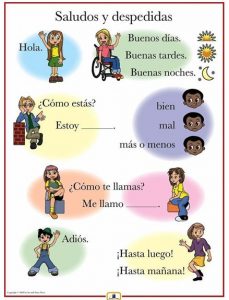By Suzanne A. Marshall from the July 2017 Edition
Do you speak Spanish? I am asked this question by family and friends when I return from paradise to visit  them in Canada each year. Sometimes when we’re gabbing on the telephone they will hear me saying a few phrases to my ‘Amiga’ who comes in to clean our condo regularly. They seem quite amazed to hear my Spanish and think that I sound quite proficient. This is truly a compliment. But, the truth is I am still a beleaguered student who labors over regular internet lessons and tries, in all sincerity, to achieve a level of fluency that I have made my objective. I’m finding it more difficult than I had hoped.
them in Canada each year. Sometimes when we’re gabbing on the telephone they will hear me saying a few phrases to my ‘Amiga’ who comes in to clean our condo regularly. They seem quite amazed to hear my Spanish and think that I sound quite proficient. This is truly a compliment. But, the truth is I am still a beleaguered student who labors over regular internet lessons and tries, in all sincerity, to achieve a level of fluency that I have made my objective. I’m finding it more difficult than I had hoped.
It doesn’t hurt that Canada is a country with two official languages; English and French. And, of course, our educational system includes a core curriculum necessitating French as part of our requirements for diplomas. It definitely does not make us fluent in the language. That being said though, it does help stave off the fear of conjugating verbs as there is definitely a similarity between French and Spanish in this regard, as well as some of the root vocabulary, which is Latin based. On the other hand, to some degree, it can also cause some confusion as I find myself using the odd French word that burps up from some subconscious level. I can also imagine that conjugation may well have certain people holding their breath with trepidation since conjugation is much more complicated in Spanish than it is in English. That, of course, is my opinion.
 I am a believer that, as a foreigner living in another country, I should make a serious effort to speak the local language. We certainly expect this in our countries of origin and anticipate that the immigrated populous will learn English. It’s rather humbling to find myself in the same situation, and suddenly understanding how difficult this can be, especially in retirement, and with a ‘not-so flexible’ senior brain.
I am a believer that, as a foreigner living in another country, I should make a serious effort to speak the local language. We certainly expect this in our countries of origin and anticipate that the immigrated populous will learn English. It’s rather humbling to find myself in the same situation, and suddenly understanding how difficult this can be, especially in retirement, and with a ‘not-so flexible’ senior brain.
I now understand why foreign communities seek each other out. And there might even be a bit of shame in there for being a bit judgmental. We want and need to be understood, share our commonality and enjoy the familiarity of our common ‘tongue’. Many of the expat community here in paradise are also finding themselves challenged with the goal of speaking Spanish. But, we labor on and, I do have to say that the effort has certainly  improved my ability to speak and listen in Spanish. Something concrete must be happening at a subconscious level so I soldier on and hack my way through one lesson after another. I also continuously return to the beginning to refresh the basic tools.
improved my ability to speak and listen in Spanish. Something concrete must be happening at a subconscious level so I soldier on and hack my way through one lesson after another. I also continuously return to the beginning to refresh the basic tools.
I believe one of the obstacles to real fluency is the fact that we are not immersed in the world of daily jobs and raising our young families anymore. We are somewhat cocooned. We are also allowed to bypass the Mexican television and radio channels with our fancy satellites and internet technology so readily available pretty much anywhere in the world now. I am told by our Mexican neighbors that this is one of the better ways to learn the language. Especially telenovelas (soap operas)! I do listen to local radio and Spanish music almost every day and I must admit that I understand much more of the lyrics and radio commercials than I used to. I have hinted to my husband that we should try to pick a couple of Spanish television pro- grams that we can watch regularly, perhaps twice a week, for an hour or so. I’m still working on that.
 Another issue for us is the fact that these wonderful Mexicans are learning to speak English in school now. English is the language of commerce. Manzanillo is a port city, and though not as ‘tourism’ oriented as other centers, there are resorts, hotels and restaurant jobs that will pay far better wages if people are bilingual in Spanish and English. Most of our Mexican neighbors in the building where we live come regularly from Guadalajara to relax on weekends and enjoy the resort atmosphere. I would say that 90% of them speak English. I am very impressed by this fact. It only serves to make me more deter- mined to learn their language as well. And when I say that they speak the language, I mean they speak it beautifully. And so, of course, having wintered here for many seasons and now having been here permanently for the last year, their expectation is pretty much as mine was in Canada. When are you going to speak the local language? I’m feeling the pressure a little.
Another issue for us is the fact that these wonderful Mexicans are learning to speak English in school now. English is the language of commerce. Manzanillo is a port city, and though not as ‘tourism’ oriented as other centers, there are resorts, hotels and restaurant jobs that will pay far better wages if people are bilingual in Spanish and English. Most of our Mexican neighbors in the building where we live come regularly from Guadalajara to relax on weekends and enjoy the resort atmosphere. I would say that 90% of them speak English. I am very impressed by this fact. It only serves to make me more deter- mined to learn their language as well. And when I say that they speak the language, I mean they speak it beautifully. And so, of course, having wintered here for many seasons and now having been here permanently for the last year, their expectation is pretty much as mine was in Canada. When are you going to speak the local language? I’m feeling the pressure a little.
But there are some serious issues to deal with. I explain. No opportunity for practice. In so many activities of our daily lives, like shopping, restaurants and cinemas, I boldly venture out with my tentative Spanish and immediately receive a response in English. They want to practice, too! But I shall persevere and can only hope that I can achieve some real proficiency before I kick the bucket! I have been told, now and then, by a Mexican local, that my Spanish is good and I certainly am encouraged by the appreciation. Even if you make mistakes, they respect the effort. You can always ask them if your phrasing is correct and they will usually be ready to assist you immediately. They are so gracious.
Years ago, I had a Spanish tutor who claimed that English- speaking people learning Spanish often use it much more readily than the reverse, because we are not afraid to make total fools of ourselves. I think that may apply to me, as I barge out there and have a good laugh with them when caught in a language quandary. Mexicans are a little more timid, I understand, as they are embarrassed by mistakes.
There are a number of positive side benefits to be gained by making the effort to learn another language. I am honestly experiencing them; including improved memory and recall, as well as listening skills and concentration. It’s exercise for the brain. Here are some reasons to take the challenge now that I’ve shown you that many of us struggle with it and that we’re all in the same boat.
Benefits of Bilingualism
- You become smarter. “Speaking a foreign language improves the functionality of your brain by
 challenging it to recognize, negotiate meaning, and communicate in different language ”
challenging it to recognize, negotiate meaning, and communicate in different language ” - You build multitasking skills. “Multilingual people, especially children, are skilled at switching between two systems of speech, writing and structure.” This makes for better multi- tasking.
- You stave off Alzheimer’s and dementia. “For monolingual adults, the mean age for the first signs of dementia is 71.4. For adults who speak two or more languages, the mean age for those first signs is 5.”
- Your memory improves. “According to a study from the University of Chicago, bilinguals tend to make more rational decisions. Any language contains nuance and subtle implications in its vocabulary and these biases can subconsciously influence ”
- You become more perceptive. “A study from Spain’s University of Pompeu Fabra revealed that multilingual people are better at observing their surroundings. They are more adept at focusing on relevant information and editing out the irrelevant.”
- Your decision-making skills improve. “According to the University of Chicago, bilinguals tend to make more rational decisions. Any language contains nuance and subtle implications in its vocabulary and these biases can subconsciously influence your ”
You improve your English. “Learning a foreign language draws your focus to the mechanics of language: grammar, conjugations, and sentence structure. This makes you more aware of language and the ways it can be structured and manipulated. These skills can make you a more effective communicator and a sharper editor and writer. Language speakers also develop a better ear for listening, since they are skilled at distinguishing meaning from discreet sounds.”
Download the full edition or view it online
—
Suzanne A. Marshall hails from western Canada and has been living the good life in Manzanillo over the past 8 years. She is a wife, mom and grandma. She is retired from executive business management where her writing skills focused on bureaucratic policy, marketing and business newsletters. Now she shares the fun and joy of writing about everyday life experiences in beautiful Manzanillo, Mexico, the country, its people, the places and the events.




